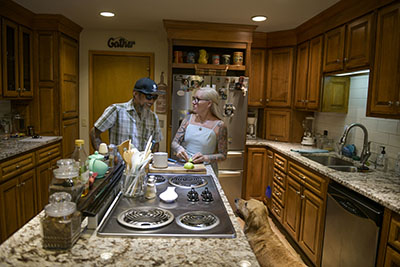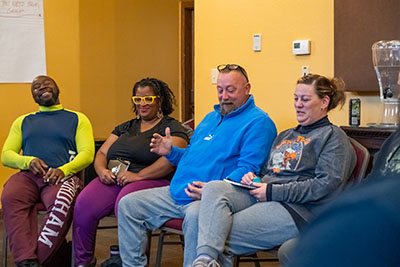Wounded Warrior Project Programs Join Forces to Empower Couples to Address Money Matters

What’s your ideal date night? A fancy dinner, a concert, or a walk on the beach? What about pulling out some spreadsheets and creating a budget?
Talking financials or debt management may not seem like the most romantic dinner conversation, but it’s a major component of relationships. Financial issues are a leading cause of stress for many Americans. For veterans and service members and their partners, added stressors like deployments, physical injuries, or post-traumatic stress disorder (PTSD) can compound those issues.
“Finances can affect every aspect of a person's life,” WWP financial readiness manager Deborah Olvera said.
Wounded Warrior Project® (WWP) offers life-changing programs and services to help veterans and their families address these stressors from multiple angles. Recently, WWP integrated its Financial Readiness program into Project Odyssey®, a 12-week mental health program that uses adventure-based learning to help combat and manage symptoms of PTSD, anxiety, and stress.
The Financial Readiness team creates unique lessons and activities around the theme of the Project Odyssey.
“What we really want to do is get [the couples] to open up and start talking about finances,” Deborah said. “Maybe just sharing some of the struggles they face or some things that work for them.”
The response to the added element of financial education at the couples Project Odyssey was overwhelmingly positive.
“It was fun. Warriors were opening up and self-disclosing whether they were the spender or the saver,” Deborah said. “They were all laughing and joking. It was a very engaged group.”
Deborah said programs like Project Odysseys are a great place to open up and discuss financial concerns. There’s a valuable connection to veterans and other veteran spouses surrounding each other for support.
“It was really a great environment. They felt safe there,” Deborah said. “It's important that we create a safe space for them to talk, not feel judged, and know that the person across from them has probably had their struggles, too.”
Learn more about Project Odyssey.
‘Talking Money with My Honey’
With financial concerns reported as a major cause of strain or disagreement in a relationship, couples Project Odysseys have been a particular focus of WWP’s Financial Readiness program. The couples Project Odysseys support warriors and spouses in addressing relationship strains and improving communication.

Deborah said the financial education exercises designed for couples encourage them to share concerns, ideas, and long-term goals. It also teaches them how to make financial decisions together.
For example, during one Project Odyssey, couples were given a pretend $100,000 check made out to them. They had three minutes to decide how they would spend it. Deborah was pleasantly surprised to see how quickly and easily the couples compromised and settled on a mutual plan.
The financial education team’s lesson plan, “Talking Money with My Honey,” encourages couples to be open and honest with each other when talking about money, and making the time to do it.
“One of the things that I found really seemed to pique a couple’s interest is when we talk about setting time to talk to each other,” Deborah said. “We call it a financial date night.”
Here are some tips when planning a financial date night:
- Select a topic beforehand. Deborah suggests couples pick a topic to focus on ahead of time. It doesn’t have to be about sticking to a budget or talking about bills. It could be about discussing future financial goals, like taking a vacation.
- Set a time limit: You don’t have to spend the entire date night discussing finances. Designate 20 or 30 minutes for the topic, with each partner having 10-15 minutes to share their thoughts and suggestions.
- Listen and ask for clarification. Deborah said if problems arise, it’s often because of miscommunication and different ways of hearing things. For example, if one partner says they want to save money for a boat, the other partner may think it’s because they want to engage in their hobbies without considering the family, when, in fact, it could be their way of spending more time with the family. Rather than get upset, ask the reasoning behind the decision and see if there’s some common ground. “You never really know until you give them the grace and the time to verbalize why they want this and what their dream is,” Deborah said.
- Create a dream board: Couples can use date night to get creative. Think about what you each would like to do. Want to save for a vacation, a new car, maybe a home? Put it on the dream board and see what matters most to each person. Discuss the best tactics to make those dreams come true.
- Plan other activities around the date: Make financial date night an event to look forward to rather than a chore. Add on a game, your favorite movie or TV show together, or a walk. “Financial date nights are really just about opening up to having conversations together and aligning priorities and goals,” Deborah said.
- Include the kids: Can’t find a sitter or schedule alone time regularly? Deborah said it’s OK to include children in the conversation. You don’t have to share all the details or the financial stresses you may have, but you can make them feel like they can contribute to the family’s financial goals. Explaining that they may not get something because you’re saving for a family trip or including them in plans to save money on food like “build your own pizza” night at home are good ways to involve children while giving them something to look forward to. “It helps them understand that sometimes they have to make sacrifices, but sacrifices don't always have to hurt,” Deborah said.
By taking proactive steps toward financial health, veteran families can build a more secure and prosperous future.
Money and Mental Health
Debt management and financial health affect everyone. They are critical aspects of life. Veterans often face unique financial challenges and pressures that make managing debt and maintaining financial health even more critical.

Many veterans transition from a structured military life to a civilian world that is more financially complex and less predictable. They may encounter difficulties finding employment that matches their skills. Combat veterans are also more likely to return with physical or mental health injuries that can make it harder to work and increase medical expenses. Without proper debt management, these challenges can lead to a financial crisis. It’s this financial stress that can exacerbate mental health issues and become a vicious cycle.
“If you're having a hard time figuring out how you're going to pay your bills or you're receiving a call from your car lender and they're threatening repossession of your vehicle, you don't want to get out of bed,” Deborah said. “You don't know what else to do. You're at a point where you just want to hide from it.”
The goal of WWP’s Financial Readiness program, and its inclusion in Project Odysseys, is to alleviate the stigma around talking about money and financial concerns.
“We really need to make finances and personal finance management easy to talk about,” Deborah said. “There shouldn't be any shame in having financial issues. We're not taught about it in school, and we’re not born knowing this information. Most of the time when you learn, you're learning from the mistakes that you're making, and sometimes even then, you don't know what the right move is or what your options are.”
And if problems do arise or you don’t know where to turn, be willing to reach out. WWP’s Financial Readiness program can empower warriors to take charge in managing their finances and building a strong financial foundation.
“Asking for help does not mean you are failing. We all need to ask for help at some point,” Deborah said. “You don't have to do it alone. There are lots of resources.”
WWP also offers help with benefits assistance, employment resources, mental health services, family support, and more.
“We connect warriors with other WWP resources so that they have as much support as they can get,” Deborah said. They have more than one place to go.”
Contact: — Paris Moulden, Public Relations, pmoulden@woundedwarriorproject.org, 904.570.7910
About Wounded Warrior Project
Since 2003, Wounded Warrior Project® (WWP) has been meeting the growing needs of warriors, their families, and caregivers — helping them achieve their highest ambition. Learn more.